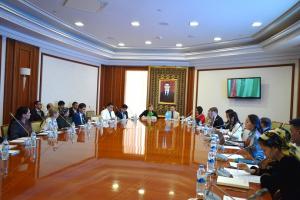As the global economy emerges from the COVID-19 pandemic and governments strengthen efforts to “build-back-better”, trade as an engine of growth has re-emerged in policy agendas. For developing countries and countries with economies in transition that are still in the process of accession to the World Trade Organization (WTO), technical support continues to be critical to enhance the understanding of international trade disciplines, potential costs, benefits and trade-offs involved in trade integration as well as to ensure the negotiations bring sustainable development outcomes for vulnerable populations.
Turkmenistan became a WTO candidate for accession in 2022, which signals the readiness of its authorities to accelerate reforms regarding trade in goods and services, as well as general business climate issues, with the goal to diversify its economy. The country has already made significant progress in this regard, adopting several programmes to facilitate trade, attract foreign direct investment and build logistics infrastructure (e.g. “Programme for the development of the foreign economic activity of Turkmenistan for 2020-2025”, “National programme of socio-economic development of Turkmenistan for 2011- 2030”). The WTO accession process and associated reforms will further support these objectives and bring other spill-overs linked to enhancing digitalization and boosting entrepreneurship.
The training was organized by UNECE in cooperation with the Government of Turkmenistan and supported by the Office of the UN Resident Coordinator. It was attended by officials of the Ministry of Finance and Economy, Ministry of Trade and Foreign Economic Relations, other line ministries, customs and statistics authorities, international organizations, financial institutions and the private sector.
The training covered various aspects of the WTO accession process, with a focus on non-tariff measures. Participants considered new emerging themes in international trade discussions, such as the circular economy and digital and green transformations. They learned about how UNECE tools, including Studies on Regulatory and Procedural Barriers to Trade, standards and recommendations developed by the UNECE Working Party on Regulatory Cooperation and Standardization Policies, the Working Party on Agricultural Quality Standards, and the United Nations Centre for Trade Facilitation and Electronic Business (UN/CEFACT), as well as other instruments that can help prepare authorities and other trade stakeholders to benefit from new commercial opportunities that can result of reforms envisaged as part of the WTO accession journey. Case studies from recent achievements of Kazakhstan, a recently acceded WTO member from Central Asia, where also discussed.
This training builds on other engagements by UNECE with the Government of Turkmenistan in the field of economic cooperation and trade, including a forthcoming project on regulatory and procedural barriers to trade, assessment of the readiness to implement the WTO Trade Facilitation Agreement, and a review of Turkmenistan’s innovation ecosystem, which will be rolled out in response to recent requests for technical cooperation.
Note to editors
UNECE assists developing countries to harness trade, innovation and infrastructure financing and investment for sustainable development. UNECE will continue to practically support WTO acceding countries like Turkmenistan to develop trade capacities and enhance their competitiveness. UNECE’s 17 programme countries in Central Asia, the Caucasus, the Western Balkans and Eastern Europe will continue to receive technical assistance in close cooperation with UN Country Teams.


